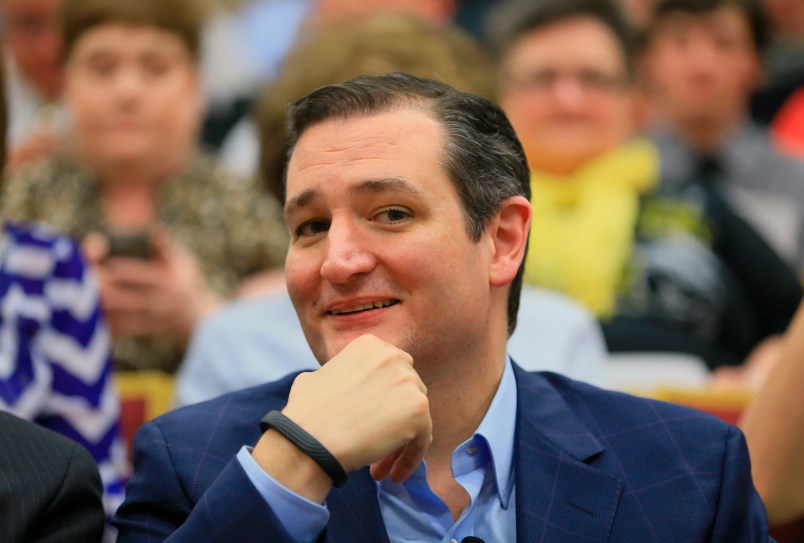In June, the Supreme Court ruled that the Constitution protects the right of same-sex couples to marry and that states are required to issue them marriage licenses. Yet many public officials have publicly encouraged people to break the law. Among them are attorneys, such as Texas governor Greg Abbott and U.S. Senator Ted Cruz. They may frame their opposition as standing up for what’s right. But according to the ethical rules of lawyers, public officials who are attorneys defying the Supreme Court by refusing to perform same-sex marriage ceremonies or encouraging others to do the same should be disbarred.
Article VI of the Constitution makes it the supreme law of the land. The Supreme Court gets the final say on what the Constitution means. The Court may be wrong, and on occasion it has been, such as with slavery and the separate-but-equal doctrine. Yet until it is overturned by constitutional amendment or it reverses itself, the Supreme Court’s rulings on the Constitution are binding precedent on all lower courts and public officials. Every lawyer and law student knows this.
Public officials are entitled to express disagreement with Supreme Court decisions, but they are not free to disregard them, or encourage others to do so because they are legally and ethically bound to obey them. They are in a different position from ordinary citizens when it comes to civil disobedience and defying the Supreme Court. Individual citizens may ignore the Supreme Court on matters of conscience, but at their own legal peril. Public officials do not have this luxury. Almost all public officials, including elected, appointed, and civil service across the country take an oath to uphold and defend the Constitution.
Refusing to follow a Supreme Court ruling as a public official, especially when one takes an oath to obey it–and even more so when one is entrusted to enforce the law–is illegal. That alone limits their ability to invoke conscience as an excuse to disobey. Now add to that an additional issue: What if the public official is an attorney?
The American Bar Association designed the Model Rules of Professional Conduct to define ethical duties of attorneys. State Supreme Courts have adopted versions of the Model Rules as binding upon attorneys who practice law in their jurisdictions. Attorneys are not free to ignore them–compliance is conditioned upon being licensed to practice law–and failure to obey could result in disbarment.
In the preamble, the Model Rules declare that lawyers must “demonstrate respect for the legal system and for those who serve it, including judges.” The Model Rules state that it is permissible to disagree with court decisions, but lawyers have a duty to uphold the legal process. This includes respect for, and compliance with, Supreme Court decisions. Model Rule 3.5 admonishes an attorney not to “engage in conduct intended to disrupt a tribunal.” Rule 8.4 declares that it is professional misconduct for attorneys to violate these rules, or to commit an illegal act that reflects adversely on their fitness to practice law. Rule 1.6 prohibits attorneys from using their legal skills to help others commit or plan a crime.
For Greg Abbott, Ted Cruz, and other attorneys who are public officials, their refusal or advocacy to others to refuse to perform same-sex marriages is both illegal and unprofessional conduct. Attorneys as public officials are legally and ethically bound to comply with the Supreme Court same-sex marriage ruling. Their refusal to do so means they should face disciplinary action for their behavior, and other attorneys who know of their contempt for the law are required to report them.
David Schultz is a professor of political science at Hamline University in Minnesota and a member of the Scholars Strategy Network.







They should also be spanked.
Then how does one petition the ABA, or another legal forum, to rescind their credentials as lawyers?
The ABA doesn’t license attorneys; one would have to complain to the Texas Bar. Realistically, they aren’t going to do anything. Lawyers get disbarred for stealing client escrow funds and the like, not for stuff like this. Anyway, their fulminating has had no effect, and they both know it. Gay marriages are being performed all over Texas despite them, and I suspect a majority, even in Texas, approve or don’t care. If these guys want to take a stand on a losing battle, why try to stop them?
Absolutely agree with this passage!
That is precisely why many officials in Washington DC, and many other places, should be removed from their positions and disbarred when appropriate for refusing to heed SCOTUS ruling on their district/State/City unconstitutional gun control laws.
Such as … ?
(For the record, I agree. An attorney who is advocating others to enforce gun control of some sort which the SCOTUS has deemed unconstitutional should be disbarred. I just don’t see any examples of that in recent memory.)